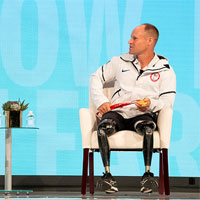Ebele Kemery:
Let’s talk about masculinity and its pervasiveness in society. Particularly how does it, in its current definition, influence culture?
Wade Davis:
As we as leaders need to create…need to want culture adds, not culture fits…right? Because the culprit culture was created in the image of men, primarily white men. So when you enter in anything that is new into that culture, it’s adding to it, it can’t fit into it. So you and I would never actually fit into a certain corporate culture. What we do it we add to it, we make it expand and evolve. So when I think of masculinity, I think of us having to broaden it.
Ebele Kemery:
And you can truly show up as yourself and do your best work. In that case, I want to talk about being in the NFL.
[Wade chuckles]
But recognizing that you did not come out ‘till after you retired.
Wade Davis:
Yeah. And what I say is that I didn’t come out. What I say is I invited the world in. Like, the idea of coming out, and everyone thinks of coming out of “the closet.” LGBT people are not wire hangers, we’re not smelly shoes, right.
[Ebele laughs]
We’re real people, and when we say that someone has not come out, what we’re saying, what you’re saying is that the work is on me. Uh-uh. The work is on heterosexual people to do your work so that you create the conditions for us to go, “Oh, come inside and let me find out what’s happening inside of me.”
Ebele Kemery:
Wade, how would you describe belonging and what does that mean to you?
Wade Davis:
I think of belonging as having an organization that is creating the conditions for me to do my best work. I started doing this work because I did something deeply sexist. I called a colleague of mine “sweetie” in the workplace. And when I called her “sweetie,” she looked at me and she said, “Don’t ever call me sweetie.” My actions had nothing to do with Erica and everything to do with me. And I had to realize that I would never have called a man “sweetie” and I had to wrestle with all of the ways that I had been socialized to treat women in the workplace differently. Accountability is not something that I’m doing because I don’t like you; something that I do because I believe in you and I believe that you can do better. Anytime you create the conditions for people not to do their best work, it is a leadership problem.
Ebele Kemery:
How about that.
Wade Davis:
It’s nothing else, right?
Ebele Kemery:
If we get this right, what does the future look like?
Wade Davis:
If we get this right, what does the future look like…
[silence]
I would say it looks like that we actually don’t even need to have these conversations anymore.
END









